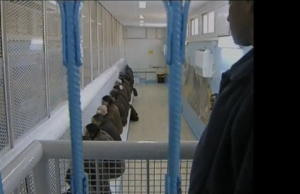
(Reuters) — Israel’s parliament on Thursday (July 30) passed into law the ability to force-feed prisoners on hunger strike, a move that has met vehement opposition from the country’s medical association.
Prime Minister Benjamin Netanyahu’s rightist coalition weathered a lengthy parliamentary debate and the law passed with 46 lawmakers in favour and 40 opposed in the 120-seat Knesset.
Israel has long been concerned that hunger strikes by Palestinians in its jails could end in death and trigger waves of protests in the occupied West Bank and East Jerusalem.
The Palestinian minister of prisoners, Issa Qaraqea, condemned the law.
“Israel is again listing its crimes and aggressions towards the (Palestinian) prisoners under what it calls law. This situation is threatening the prisoners’ lives and is even against the ethics of the medical profession. The global union of doctors condemned this law and even the doctors association in Israel called on doctors not to deal with this law,” he said in the West Bank city of Ramallah.
In the West Bank city of Jenin, freed Palestinian prisoner and Islamic Jihad leader Khader Adnan, who Israel released at the beginning of the month following a deal in which he agreed to end a 56-day hunger strike, also condemned the law.
“I think this is a Palestinian victory. This is an Israeli bankruptcy in dealing with the situation of the Palestinian hunger striker prisoner. We as Palestinians need to raise our voice and tell the world that the occupation is lying saying that Israel is ‘the one of the democratic countries’ and a wall between the East and the West. They are nothing but racists,” he said.
Israel had arrested Adnan last July for the 10th time, detaining him without trial under so-called administrative detention, a method Israel says it employs as a security measure to prevent violence.
Adnan, a father of six from the West Bank city of Jenin which launched celebrations when he returned home, had begun an extended hunger strike in 2012 that also led to his freedom.
Adnan’s strike had galvanised Palestinians behind a “battle of empty stomachs” against Israeli detentions without trial and both sides had feared the threat of his death could hurt a shaky Gaza truce or spur further violence.
During the legislation process of the bill authorising force-feeding of hunger striking prisoners, the Israeli measure has hit obstacles, such as condemnation by the national doctors’ union, which says it contravenes ethical commitments.
Israel’s Medical Association, which considers force- feeding a form of torture and medically risky, has urged Israeli doctors not to abide by the law.







